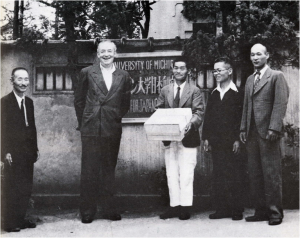Presented By: Center for Japanese Studies
CJS Noon Lecture Series
Roots of Japanese Studies in the USA: Anthropology, War, and CJS at Michigan

Speaker: Katsumi Nakao, 2014-15 Toyota Visiting Professor, Center for Japanese Studies, University of Michigan
Before WWII, the field of Japanese Studies originated from U.S. political motives. Ruth Benedict’s, The Chrysanthemum and the Sword (1946) is widely known as an anthropological study of Japan that resulted from wartime research. I will describe the roots of Japanese Studies in the US, as well as US development of the subject area from the wartime to post wartime.
The Office of Strategic Services (OSS) and the Office of War Information (OWI) were two organizations through which many anthropologists were recruited into the field. Specifically, I will focus on the background of Japanese studies at the University of Michigan from the historical anthropological research.
Katsumi Nakao is the 2014-15 Toyota Visiting Professor at the Center for Japanese Studies at the University of Michigan, and Professor of Liberal Arts (history and anthropology) at J.F. Oberlin University in Tokyo. His professional career began with a Bachelor of Law degree from Chuo University. Later, he received a Master of Law degree from Meiji University and a Doctor of Human and Environmental Studies degree from Kyoto University. Along with his professorial appointments, he has also acted as a special assistant at the Consulate General of Japan in Hong Kong (1987-1989) and a researcher of Japanese Society for the Promotion of Science (1989-1990). Currently, Professor Nakao is conducting comparative work in Taiwan (aboriginal communities) and Japan (Fukushima) on radiation pollution from nuclear power plants.
Before WWII, the field of Japanese Studies originated from U.S. political motives. Ruth Benedict’s, The Chrysanthemum and the Sword (1946) is widely known as an anthropological study of Japan that resulted from wartime research. I will describe the roots of Japanese Studies in the US, as well as US development of the subject area from the wartime to post wartime.
The Office of Strategic Services (OSS) and the Office of War Information (OWI) were two organizations through which many anthropologists were recruited into the field. Specifically, I will focus on the background of Japanese studies at the University of Michigan from the historical anthropological research.
Katsumi Nakao is the 2014-15 Toyota Visiting Professor at the Center for Japanese Studies at the University of Michigan, and Professor of Liberal Arts (history and anthropology) at J.F. Oberlin University in Tokyo. His professional career began with a Bachelor of Law degree from Chuo University. Later, he received a Master of Law degree from Meiji University and a Doctor of Human and Environmental Studies degree from Kyoto University. Along with his professorial appointments, he has also acted as a special assistant at the Consulate General of Japan in Hong Kong (1987-1989) and a researcher of Japanese Society for the Promotion of Science (1989-1990). Currently, Professor Nakao is conducting comparative work in Taiwan (aboriginal communities) and Japan (Fukushima) on radiation pollution from nuclear power plants.